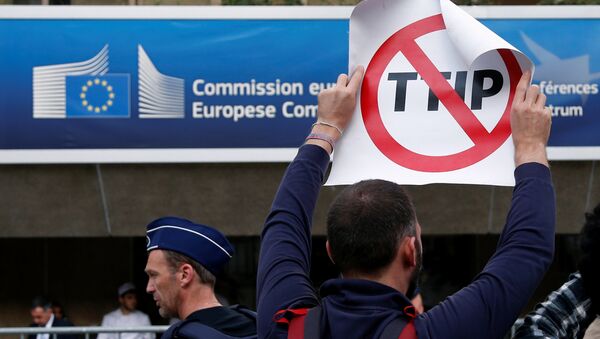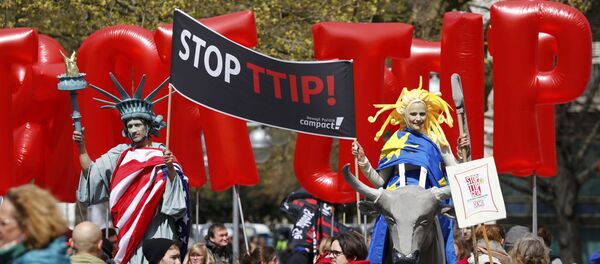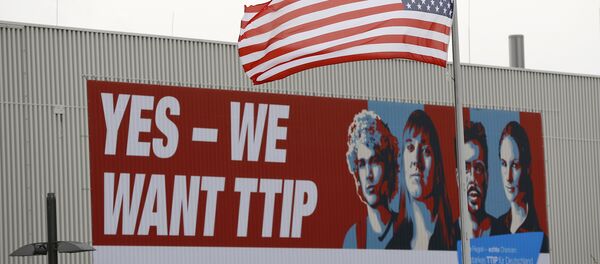The Transatlantic Trade and Investment Partnership (TTIP) was expected to become one of the most important achievements of President Barack Obama.
This milestone deal would connect the two biggest markets in the world and bolster US leadership in writing the rules of global trade, an article by the Carnegie Moscow Center think-tank read.
If the deal is approved the US will be in the center of a new geo-economic structure while other nations will have to find ways to join the US-led blocs.
This is why back in 2013, when the TTIP negotiations started, Obama gave the work to Michael Froman, one of the most influential and experienced members of his team. Now, completing the TTIP talks (and ratifying the TPP in Congress) before Obama leaves is one of the priority goals of his administration.
At the same time, the 14th round of the talks in Brussels in July showed that the ambitious deal is still in question.
Farmers Against TTIP
Since the beginning of the talks, Europe has been very concerned because of their secrecy. Only European governmental officials, EU bureaucrats and representatives of major corporations were allowed to attend the negotiations. After Greenpeace published over 200 pages of the preliminary text of the deal (14 chapters) on May 2, 2016 the number of TTIP opponents sharply increased.
French President Francois Hollande harshly criticized the deal, saying that France will not accept a trade deal that goes against "essential principles."
European farmers and agricultural lobbyists are the most active opponents of the TTIP deal. Their main concern is geographical marks on agricultural products. This issue is especially important for French and Italian farmers. They fear that if the deal is approved the European market will be flooded with cheaper US products.
European farmers are also concerned that the TTIP will challenge the European norm which prohibits selling products until they are proved to be safe for people and the environment. As a result, cheap meat products containing hormones would flood the European market, according to the article.
Finally, the US and Brussels cannot agree on the issue of export subsidies for agricultural producers. Washington insists that countries should not introduce export subsidies for agricultural goods exported to other countries.
Big Companies Against TTIP
Another stumbling block over the TTIP deal is access to government procurement programs, according to the leaked text of the deal.
The US does not want to give European companies access to its railway transportation market, to aviation safety contracts and also to the procurement program of the US Federal Aviation Administration.
Moreover, European companies want to get broader access to procurement in some US states and cities, the article read.
Another problem is liberalization of the mutual access to the service market. The EU bans access for foreign companies to 250 types of services, including communications, education, transportation and finances. The US wants Brussels to reduce the list. In exchange, Washington promises to lift barriers in the domestic market and keep restrictions in only nine service sectors, including finances and healthcare.
There are also difficulties in the energy sphere. The European Commission has long been trying to arrange supplies of liquefied natural gas (LNG) from the US, thus reducing Europe’s reliance on Gazprom. This initiative was blocked by US legal barriers which restrict LNG exports from the eastern coast.
The EU also wants to have equal-opportunity access to the US oil and gas transportation infrastructure in exchange for the same option for American companies in Europe.
Bureaucrats Against TTIP
The US proposals on the deal include some points that directly affect the interests of the European Commission and national governments.
For example, Washington insists on imposing in the EU the US Regulatory Analysis mechanism which would increase costs of adopting new laws, standards and technical norms.
In addition, the US also opposes the replacement of arbitration courts with transparent national commercial courts to settle trade and investment disputes.
Brexit Against TTIP
The results of the Brexit referendum in the United Kingdom dealt a heavy blow to the TTIP deal. Before Brexit, then-Prime Minister David Cameron was an avid supporter of the deal but many members of the new cabinet oppose it.
Moreover, the talks cannot go further until the terms of the UK withdrawal from the EU are clarified. This could take years.
Finally, there are two serious critics of the TTIP in the US. They are presidential candidates Hillary Clinton and Donald Trump.
During a meeting with voters in Michigan, Clinton said she will not support a deal that will increase unemployment in the US. Clinton commented on the TTP deal but the TTIP is based on the same principles.
Trump made a similar statement during his speech in Detroit, calling the TPP a "disaster." Criticism of the TPP and the TTIP has been one of the key points of Trump’s campaign.
"Taking into account all of the above, the TTIP deal is unlikely to become real in the coming years. And if the TTP is not ratified by the US Congress the most ambitious part of Barak Obama’s foreign policy agenda will fail," the article concluded.





